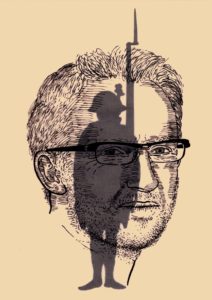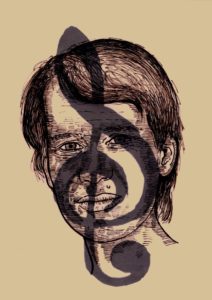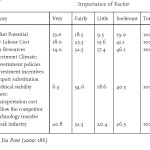David van Reybrouck – Revolusi. Indonesië en het ontstaan van de moderne wereld
In Nederland wordt een groot onderzoek gedaan naar het koloniale verleden*. Kolonialisme als oud zeer moet worden erkend, vindt ook David Van Reybrouck in zijn recent verschenen boek ‘Revolusi – Indonesië en het ontstaan van de moderne wereld’ waar hij vijf jaar intensief aan werkte. Het boek beslaat drie eeuwen, met veel aandacht voor de periode van de onafhankelijkheidsstrijd en dekolonisatie (1920-50).
Indonesië, het op drie na grootse land van de wereld, was het eerste dat na de Tweede Wereldoorlog, zijn onafhankelijkheid uitriep. Twee dagen na de Japanse capitulatie in augustus 1945 barstte een strijd los die meer was dan een conflict met de kolonisator Nederland. Op 17 augustus 1945 riep Soekarno de Onafhankelijkheid uit. Het was wereldgeschiedenis, het begin van de wereldwijde dekolonisatie. Pas in 1949 liet Nederland na veel strijd Indonesië gaan. Indonesië werd een voorbeeld voor andere koloniën, die in snel tempo ook onafhankelijk werden.
Tien jaar later organiseerde Soekarno, de eerste president van het land, de Asia-Afrika-conferentie van Bandung, het eerste mondiale congres zonder het Westen. Het werd een waterscheiding in de internationale politiek. In 1965 werd Soekarno afgezet en vervangen door de Soeharto. En kwam een einde aan de vrijheid in Indonesië. “Eigenlijk zijn we nooit onafhankelijk geworden’, concludeert Van Reybrouck.
In Revolusi verwerpt David Van Reybrouck het bekende nationale perspectief van de Indonesische vrijheidsstrijd. Bij de Indonesische onafhankelijkheidsstrijd waren meer partijen dan Nederland en Indonesië betrokken: Japan speelde een belangrijke rol met de bezetting van Indonesië, Groot-Brittannië, dat troepen stuurde, en de Verenigde Staten.
Naast het verrichten van research in archieven, interviewde hij vele plaatselijke jongeren waarmee de revolutie begon (inmiddels 90-plussers) die de grondslag legden voor een nieuwe wereld, de allerlaatste getuigen, die hij vond in Indonesische rusthuizen, op het platteland en op verafgelegen eilanden. Om de internationale dimensie te begrijpen, trok hij tevens naar Japanse miljoensteden, Nepalese bergdorpjes en Nederlandse buitenwijken.
De grote politieke ontwikkelingen verweeft Van Reybrouck met de vaak heftige herinneringen van hen die erbij waren. Zoals bij de in Nederland als Bersiap-periode bekende tijd, toen de Nederlandse troepen in 1945 terugkeerden en een golf van geweld begon. In Indonesië hoorde het geweld bij de omwenteling van de orde.
Hij laat honderden stemmen horen, die eerder niet werden gehoord.
Zo ontmoette hij Djajeng Pratomo, die in een rusthuis in Callantsoog zijn laatste jaren doorbrengt. Hij werd geboren in 1914, het jaar dat het koloniale rijk werd voltooid en als Indonesiër betrokken bij het verzet tegen nazi-Duitsland.
Een ander geïnterviewde geeft inzicht in het leven in ballingschap in Boven-Digul, Nieuw-Guinea, ver weg van Java en Sumatra. Deze onafhankelijkheidsstrijders werden onder vernederende omstandigheden geïnterneerd. ‘Nederland faciliteerde een soort Goelag voor ongewensten’, aldus Van Reybrouck.
Anderen getuigen over de verschrikkelijke honger en van Aziaten die in opdracht van Nederland met andere Aziaten moesten vechten. De oude mensen herinneren zich deze trauma’s nog steeds, hebben scherpe herinneringen aan deze periode.
In deze tastbare herinneringen schuilt zijn geschiedenis.
Het gaat over gewone mensen – in plaats van West-Europese mannen van een bepaalde leeftijd – die getuigen, en dat biedt een veelheid aan perspectieven en verhalen. Onderdrukkers en onderdrukten, Indonesische oud-strijders, bejaarde Gurkha’s, tot troostmeisjes.
Van Reybrouck schrijft de orale geschiedenissen op, zonder verwijten en dat maakt het des te indringender. Als er iemand verantwoordelijk is dan zijn dat de Nederlandse politieke leiders.
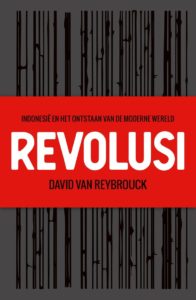 David Van Reybrouck hoopt dat het boek wordt gelezen, want licht werpen op de geschiedenis in de hoop dat ze erkend wordt, de pijn herkend wordt, kan een weg zijn naar genezing. En door deze pijn te herkennen biedt het boek hoop de hedendaagse problemen zoals het geweld dat we de planeet aan doen, op te lossen. Het boek functioneert als ‘achteruitkijkspiegel’.
David Van Reybrouck hoopt dat het boek wordt gelezen, want licht werpen op de geschiedenis in de hoop dat ze erkend wordt, de pijn herkend wordt, kan een weg zijn naar genezing. En door deze pijn te herkennen biedt het boek hoop de hedendaagse problemen zoals het geweld dat we de planeet aan doen, op te lossen. Het boek functioneert als ‘achteruitkijkspiegel’.
Van Reybrouck:
‘Mijmeren tijdens het kabbelen: zelfs als we met het kolonialisme uit het verleden ooit helemaal in het reine zijn gekomen, hebben we nog steeds niets gedaan aan de dramatische manier waarop we nu de toekomst koloniseren. De mensheid neemt de komende eeuw in met dezelfde meedogenloosheid waarmee in vroeger tijden werelddelen werden toegeëigend. Kolonialisme is niet langer iets territoriaals maar temporeels; het ergste ligt misschien niet achter ons, maar vóór ons. Wij gedragen ons als de kolonisatoren van de toekomstige generaties, wij ontnemen hun hun vrijheid, hun gezondheid, misschien zelfs hun leven.’
Indonesië en het ontstaan van de moderne wereld. De Bezige Bij, Amsterdam, 2020. ISBN 9789403183404
David van Reybrouck (1971) is cultuurhistoricus, archeoloog en schrijver. Zijn grootse succes was Congo. Een geschiedenis. In zijn essays Pleidooi voor populisme (2008) en Tegen verkiezingen (2013) pleit Van Reybrouck voor nieuwe vormen van democratie.
* zie: https://www.ind45-50.org)
Linda Bouws – St. Metropool Internationale Kunstprojecten
Noam Chomsky: Trump Has Revealed The Extreme Fragility Of American Democracy
Even after Trump-appointed bureaucrat Emily W. Murphy of the General Services Administration signed a letter enabling Biden to start working with federal agencies and prepare for a transition of power, Donald Trump has personally continued to resist conceding, thus breaking the tradition of a peaceful transition to power.
What is he after with his bogus legal challenges of a “rigged and stolen” election? Can he really hope for a legislative coup? Is the contemporary United States a country divided not merely on political and ideological issues among its body politic, but, more frighteningly, along different conceptions of reality? And will Trumpism continue after Trump has left office? Revered public intellectual Noam Chomsky sheds light on these questions with groundbreaking insights in this exclusive interview for Truthout.
C.J. Polychroniou: U.S. election officials have declared the 2020 election “the most secure in American history.” Yet, the Trump campaign continues to mount legal challenges to the electoral process, pushing outrageous falsehoods, while Rudy Giuliani has gone so far as to make outlandish claims of a vast global conspiracy to steal the election from the Great Leader. In your view, what is really behind Trump’s legal challenges?
Noam Chomsky: Speculation of course, but I’ll indulge in a bad dream — which could become reality if we are not on guard, and if we fail to recognize that elections should be a brief interlude in a life of engaged activism, not a time to go home and leave matters in the hands of the victors.
I suspect that Trump and associates regard their legal challenges as a success in what seems a plausible strategy: keep the pot boiling and keep the loyal base at fever pitch, furious about the “stolen” election and the efforts of the insidious elites and the “deep state” to remove their savior from office.
That strategy seems to be working well. According to recent polls, “Three-quarters (77%) of Trump backers say Biden’s win was due to fraud” and “The anger among Trump’s base is tied to a belief that the election was stolen.” Rejection of the legal challenges with ridicule may please liberal circles, but for the base, it may be simply more proof of the Trump thesis: the hated elites will stop at nothing in their machinations.
Meanwhile, this strategy requires keeping the wrecking ball — Trump’s symbol — actively at work. Do nothing to deal with the pandemic, even delay in providing data to Biden’s team while a top nurse’s union warns of “catastrophic death” in the growing chaos while “our hospitals are knowingly still not prepared” and the government is on vacation.
Viewed through the lens of this vile strategy, if the pandemic gets worse, so much the better. Then local officials will try to impose restrictions and even lockdowns to control patriotic Americans — in line with the plans of the supposed “Communist-run deep state” — leading to economic harm and intrusions on normal life. Meanwhile, Trump and his associates could abandon other normal governmental activities so that when Biden establishes what they describe as a “fake government” on inauguration day, the immediate problems will be severe and failure likely.
On that day, which will live in infamy among the faithful, Trump might set up what he claims is an authentic government in Mar-a-Lago, with Mitch McConnell’s Senate in his pocket and a furious popular base. The next step would be to make the country ungovernable, a specialty that McConnell has been perfecting for a decade and that an accomplished demagogue like Trump can manage reflexively. Everything that goes wrong can be blamed on the treacherous “elites.”
Trump and associates might, as some have speculated, set up an alternative media empire, incorporating talk radio and other far right outlets but perhaps not Fox, which has shown occasional signs of disobedience. Then they could come roaring back into power in 2022-2024, feeding on growing discontent.
They would then be free to destroy the environment with abandon and maximize short-term profit for their primary constituency, impose discipline on what remains of government, tame the media, institute harsh authoritarian measures elsewhere, and continue with their abject service to their masters — the real elites, the very rich and the corporate sector, the decision-makers, as recent academic research once again establishes very clearly.
It’s of no little interest that we have to turn to the world’s leading business journal, the very respectable London Financial Times, to read some elementary truths about what could once claim to be a leading democracy: “Anyone with a pulse,” Financial Times Associate Editor Rana Foroohar writes, “knows that in the US today the system is rigged in favour of the wealthy and powerful.” Foroohar adds:
One particularly illuminating paper [just cited] found that considering the opinions of anyone outside that top 10 per cent was a far less accurate predictor of what happened to government policy. The numbers showed that: ‘not only do ordinary citizens not have uniquely substantial power over policy decisions; they have little or no independent influence on policy at all’. We have had decades of legislative tweaks to everything from tax policy to corporate governance and accounting standards that have favoured capital over labour. Supreme Court decisions such as the Citizens United case have also dramatically increased the amount of money funneled into political campaigning. This has left the nature of America’s political economy perilously close to an oligopoly.
If the Trump strategy is anything like the speculation outlined above, the prevailing oligopoly might look like a fond memory.
Anger and contempt for “elites” is not a mistake, even if the real elites are effectively concealed by the propaganda machine.
Merlijn Twaalfhoven – Het is aan ons ~ Waarom we de kunstenaar in onszelf nodig hebben om de wereld te redden.
In zijn idealistische en bevlogen boek ‘Het is aan ons’ beschrijft Merlijn Twaalfhoven hoe iedereen kan bijdragen aan het oplossen van wereldproblemen. Hij stelt zich ten doel de wereld te redden en analyseert hoe het kunstenaarschap hierbij kan helpen: kunst kan houvast bieden in onzekere tijden. Twaalfhoven spreekt niet over een mooi afgerond kunstwerk – kunst moet open zijn – en iedereen moet eraan mee kunnen doen. Kunst is een speeltuin, een laboratorium voor nieuwe verbintenissen en onbevangen vragen. Het proces verloopt van Waarnemen, Voelen, Denken naar Maken. Het komt samen in een praktisch idealisme.
Twaalfhoven is op zoek naar ‘de verbinding van de nabijheid’.
Dat vereist een systeemverandering, een gezamenlijke toekomstvisie die op een waarachtige manier de menselijke waarden naar buiten brengt. Een praktisch, procesmatig idealisme.
Als componist en theatermaker organiseerde Merlijn Twaalfhoven wereldwijd voorstellingen. Hij ging de concertzaal uit en zette de muziek midden in de wereld. Als altviolist reisde hij in 1996 naar Bosnië, vlak nadat de vrede was getekend. Zijn concerten werden ‘unieke ontmoetingen’. De plaats waar werd gespeeld, werd van cruciaal belang. Hij zag wat muziek kan betekenen, al was het natuurlijk niet voldoende om een blijvende verandering tot stand te brengen. Met zijn werk voegt hij ‘een druppeltje toe aan een emmer die zich langzaam vult met vrede, moed, hoop, contact en gelijkwaardigheid’. Hij maakt ons deelgenoot van zijn reizen naar ook andere conflictgebieden waar kunst het verschil kan maken: zoals een Syrisch vluchtelingenkamp in Jordanië, de buitenwijken van Sarajevo, een huiskamerfestival in Jeruzalem, een oude pistolenfabriek in Zaandam, de Carnegie Hall in New York en een VN-conferentie in Alpbach, waar de kunstenaar werd uitgenodigd om te praten over de rol van kunst bij het halen van VN-doelen. De ontmoeting leidde helaas niet tot een concreet vervolg.
Het maken van kunst is vooral uitbesteed aan professionals, aldus Twaalfhoven. We lijken het vermogen te verliezen om zelf emoties, twijfels en dromen tastbaar te maken en vertraging te creëren. Maar schoonheid en verwondering verdienen een plek in ons leven.
Iedereen heeft een kunstenaar in zich, vrij vertaald naar Joseph Beuys. We hebben een ‘kunstenaarsmindset’ nodig, een speelse, onderzoekende, open en creatieve houding om bij te dragen aan een betere wereld. We hebben het allemaal in ons om krachten te bundelen, verhalen te vertellen, en iets van waarde te maken, tastbaar te maken wat in onszelf zit. Dan maken we het verschil.
‘Het is aan ons’, aldus Merlijn Twaalfhoven.
 Hij sluit af met wat we kunnen leren van de kerk:
Hij sluit af met wat we kunnen leren van de kerk:
Ten eerste: markeer tijd en ruimte
Ten tweede: vind je houvast
Ten derde: spreek je idealen uit
Ten vierde: doe het samen
En ten slotte: vier je voortgang!
Atlas Contact, Amsterdam, 2020. ISBN9789045039800
Merlijn Twaalfhoven is componist en oprichter van The Turn Club, een samenwerkingsverband van kunstprofessionals, veranderaars en bruggenbouwers. Hij werkte o.a. met Het Nationale Ballet, Toneelgroep Amsterdam en het Kronos Quartet.
De bijeenkomst in Paradiso (d.d. 1 november 2020) naar aanleiding van het verschijnen van het boek ‘Het is aan ons. Waarom we de kunstenaar in onszelf nodig hebben om de wereld te redden.’:
Linda Bouws – St. Metropool Internationale Kunstprojecten
Chomsky: Voting Is Not The End. It’s Only The Beginning
Joe Biden is the winner of the 2020 election. Yet while Trump has lost, the Democrats failed to materialize the blue wave some expected — and Trump fared extremely well despite the pandemic. In this exclusive interview, Noam Chomsky shares some of his insights about Trump’s continuing popularity and what the left needs to do in the years ahead, emphasizing that voting is never an end — only a beginning.
C.J. Polychroniou: Although Biden has won the election, the Democrats failed to materialize a blue-wave landslide, and it is clear we will continue to deal with large-scale Trumpism. Given that you were extremely skeptical of the polls from day one, what do you think contributed to the massive turnout for Trump, even as Biden saw an even more massive turnout? Or, to phrase the questions differently, why is nearly half the country continuing to support a dangerous charlatan leader with such a feverish passion?
Noam Chomsky: The very fact that someone could be considered a serious candidate after just having killed tens if not hundreds of thousands of Americans through a disastrous response to COVID-19 is an extraordinary victory for Trump — and a defeat for the country, for the world and for hopes for a decent future.
Some of Trump’s victories are very revealing. A report on NPR discussed his victory in a solid Democratic county on the Texas-Mexico border with many poor Latinos that hadn’t voted Republican for a century, since Harding. The NPR analyst attributes Biden’s loss to his famous “gaffe” in the last debate, in which he said that we have to act to save human society from destruction in the not very distant future. Not his words, of course, but that’s the meaning of his statement: that we have to make moves to transition away from fossil fuels, which are central to the regional economy. Whether that’s the reason for the radical shift, or whether it’s attributable to another of the colossal Democratic organizing failures, the fact that the outcome is attributed to the gaffe is itself indicative of the rot in the dominant culture. In the U.S., it is [considered] a serious “gaffe” to dare to hint that we have to act to avoid a cataclysm.
Poor working people in the border area are not voting for the predictable consequences of Trump’s race toward cataclysm. They may simply be skeptical about what science predicts. Sixty percent of conservative Republicans (35 percent of moderate Republicans) believe that humans are contributing “not too much/not at all” to global warming. A poll reported in Science found that only 20 percent of Republicans trust scientists “a lot…to do what is right for the country.” Why then believe the dire predictions? These, after all, are the messages pounded into their heads daily by the White House and its media echo chamber.
South Texan working people may not be ready to sacrifice their lives and communities today on the basis of claims in elite circles that they are instructed not to trust. These tendencies cannot be blamed solely on Trump’s malevolence. They trace back to the failure of the Democratic Party to bring to the public a serious program to fend off environmental catastrophe while also improving lives and work — not because such programs don’t exist; they do. But because they don’t appeal to the donor-oriented Clintonite neoliberals who run the Democratic Party.
There’s more. Trump has shown political genius in tapping the poisonous currents that run right below the surface of American society. He has skillfully nourished and amplified the currents of white supremacy, racism and xenophobia that have deep roots in American history and culture, now exacerbated by fear that “they” will take over “our” country with its shrinking white majority. And the concerns are deep. A careful study by political scientist Larry Bartels reveals that Republicans feel that “the traditional American way of life is disappearing so fast that we may have to use force to save it,” and more than 40 percent agree that “a time will come when patriotic Americans have to take the law into their own hands.”
Irreconcilable Differences: The 2020 Elections Prove Again The U.S. As Outlier
The most consequential election in modern U.S. history won’t produce a winner for at least a few more days. And then, the result may be contested in the Supreme Court, with unforeseen consequences for the future of democratic order.
However, while much of the media and the public are consumed with scenarios as to how Biden, or Trump, can reach the magic number of 270 electoral votes, there are some highly disturbing trends and facts about the 2020 election that need to be analyzed if progressives in the U.S. can hope to advance a successful strategy in the years ahead.
First, the polls were wrong again. A blue wave did not materialize in spite of the highest voter turnout in a century and the huge demographic changes taking place all across the United States.
Second, Biden failed to perform as expected in spite of the country being in the midst of a catastrophic pandemic, with a criminally negligent president in charge who has misled the public about Coronavirus from day one and has intentionally spread dangerous information about it.
Third, Trump did much better than expected in spite of being a charlatan, the sort of a leader who says and does such outrageous and highly dangerous things that it is simply unimaginable that citizens in other advanced democracies would have tolerated him in their midst, let alone support with a feverous passion as so many Americans do.
The 2020 U.S. elections have revealed as strongly as possible that the country remains highly polarized, marked by irreconcilable differences between red and blue states. In fact, the U.S. is probably more divided today between red and blue than it was during the 1860s, and much of the credit for this accomplishment is due to the brilliant skills of the con artist occupying the White House for the last four years. Trump has exploited the anxieties, frustrations, and fears of white America, with its toxic ideological notion of racial superiority, in a manner that would have made Joseph Goebbels feel like an amateur.
Racism has always been around. But it is more alive and kicking in today’s USA than any other time since the 1950s or 1960s. This is why Trump’s neo-fascist political posturing is found to be so appealing among such huge segments of 21 st century Americans. Democracy, for Trump and many of his supporters, is an unnecessary luxury if it would mean building a society where whites are the minority. In fact, in a survey cited in Larry Bartels’s research article “Ethnic antagonism erodes Republicans’ commitment to democracy”, “most Republicans…agreed that ‘”the traditional American way of life is disappearing so fast that we may have to use force to save it.”’ https://www.pnas.org/content/117/37/22752
This is why there was a record turnout in the 2020 election: this was an election about white Americans, as Umair Haque, Director of the Havas Media Lab, artfully argued a few days ago in his essay “Is White America Really Ready to Reject Trump’s Fascism?” https://eand.co/is-white-america-really-ready-to-reject-trumps-fascism-cf88d6f9b48d
To be sure, the U.S. remains an outlier among highly advanced societies on many issues, because racism is the driving ideological force. The U.S. is the only country in the advanced industrialized world without a universal health care system, but with a warfare but no welfare state. https://www.salon.com/2020/08/08/as-the-pandemic-has-made-clear-america-has-no-welfare-state–but-we-sure-have-a-warfare-state/
The U.S.is alone among western countries with its continued use of the death penalty (where racial disparities continue even though the death penalty usage has declined), it has not ratified the UN Convention on the Rights of the Child, and has ratified fewer key human rights treaties than all other countries in the G20 group. Additionally, it never ratified the Equal Rights Amendment proposed in 1972, and it ranks 75th globally in women’s representation in government. https://www.cnbc.com/2019/03/04/the-us-ranks-75th-in-womens-representation-in-government.html
Indeed, white America is very different from the rest of the advanced world, as Haque points out in “Is White America Really Ready to Reject Trump’s Fascism?, in profoundly striking ways: “Voters in Europe and Canada — white majorities there — can be relied upon to act with some modicum of decency and humanity and common sense. They back, over and over again, what the world now considers modern social contracts that make up functioning, sophisticated societies — healthcare, retirement, education, childcare, and so on, for all, not just themselves. It would be a massive, massive shock if voters anywhere else in the West began to act like America’s white majority — they are so far off the scale of conservatism, in formal terms, that it might as well not exist.”
In sum, what the 2020 elections demonstrate, regardless of who wins the election, is that Trumpism will remain the dominant ideological and political movement in the third decade of the 21 st century in the United States. With or without Trump in the White House, white America will surely remain vigilant in its attempt to “safeguard America’s traditional values” and, in that context, progressive forces will have their hands full.
In the light of this, the creation of a “Popular Front,” a coalition of all democratic forces of the sort that took place in Europe in the mid-1930s to combat the rise of fascism, should be embraced as possibly the only coherent strategy to roll back Trumpism. But in 21 st century USA, this would mean a commitment first and foremost to the norms and values of an inclusive democracy within the context of class-and environmental politics.
As such, “identity politics,” which has gone from inclusion to division and has led to political tribalism in U.S. society, needs to be reassessed in a manner where its positive attributes are incorporated into a broader political agenda. But this is a story for another time.
—
C.J. Polychroniou is a political economist/political scientist who has taught and worked in universities and research centers in Europe and the United States. His main research interests are in European economic integration, globalization, the political economy of the United States and the deconstruction of neoliberalism’s politico-economic project. He is a regular contributor to Truthout as well as a member of Truthout’s Public Intellectual Project. He has published several books and his articles have appeared in a variety of journals, magazines, newspapers and popular news websites. Many of his publications have been translated into several foreign languages, including Croatian, French, Greek, Italian, Portuguese, Spanish and Turkish. He is the author of Optimism Over Despair: Noam Chomsky On Capitalism, Empire, and Social Change, an anthology of interviews with Chomsky originally published at Truthoutand collected by Haymarket Books.
The Winner Of The 2020 Election Won’t Be Inheriting A Genuine Democracy
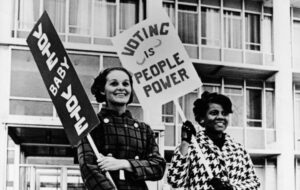 Today’s election is widely regarded as the most important national election in recent U.S. history, voters remain divided and polarized over what should be essentially the future of the country. Issues over racism, immigration, guns, women’s rights, police brutality and climate change are what essentially divide Republican voters from Democrats. The former, galvanized by the extreme and divisive rhetoric of a racist and reactionary president, wish to preserve the values of “traditional America” (white supremacy and patriarchy, militarism, rugged individualism and religiosity), while Democrats worry that another four years of Donald Trump in office will spell the end of democracy.
Today’s election is widely regarded as the most important national election in recent U.S. history, voters remain divided and polarized over what should be essentially the future of the country. Issues over racism, immigration, guns, women’s rights, police brutality and climate change are what essentially divide Republican voters from Democrats. The former, galvanized by the extreme and divisive rhetoric of a racist and reactionary president, wish to preserve the values of “traditional America” (white supremacy and patriarchy, militarism, rugged individualism and religiosity), while Democrats worry that another four years of Donald Trump in office will spell the end of democracy.
Is destroying or saving U.S. democracy what the upcoming election is all about? In this interview, political scientist C.J. Polychroniou says it is high time that we did away with the political rhetoric when it comes to U.S. democracy and look at the facts: The U.S. has a highly flawed system of democratic governance and doesn’t even rank among the top 20 democracies in the Western world, and thus is in dire need of major repair. In fact, Polychroniou argues, it is far more accurate to describe the United States as an oligarchy, a regime where an economic elite and powerful organized interests are in virtual control of the policy agenda on most issues of critical importance to public interest while average people are mainly political bystanders.
Alexandra Boutri: The general consensus among a significant percentage of voters opposed to Donald Trump is that the upcoming election represents a pivotal moment in U.S. politics, for what is at stake is nothing else than the future of democracy itself. True, or an exaggeration?
C.J. Polychroniou: Trump’s presidency has been marked from the beginning by lies, strong authoritarian impulses, contempt for the media and disdain for science, big gifts for the rich and big cuts for the poor, and complete disregard for the environment. His political posturing is outright neo-fascist, and, as such, this president surely has little concern about the subtleties of democratic governance. Of course, U.S. democracy was in a crisis long before Trump came to power. In fact, one could easily make the argument that the U.S. is not a true democracy at all (it qualifies as a mere procedural democracy), and was never meant to be when you get to understand the architecture of the Constitution, who the framers were, and why they opted to ditch, in the manner of a coup, the Articles of Confederation, during the Constitutional Convention of 1787. In fact, the drafting of the Constitution itself was not a democratic process: The delegates were sent there by state legislatures with a mandate to revise the Articles of Confederation, but, instead, they worked in total secrecy in producing an entirely new legal document for the future government of the United States.
The Constitution that the framers produced, with its system of checks and balances, was as a legal document way ahead of its time, since back then, monarchy was the prevailing form of political rule throughout the world. But in addition to designing a system of governance that would prevent the rise of an absolute ruler, the framers also wanted to make sure that the masses themselves would not be in a position to determine political outcomes. Indeed, the framers were seeking a form of government that would keep the elites safe both from the caprice of absolute rulers and from the whims of the rabble. They were indeed in complete agreement with the view of John Jay, one of the so-called Founding Fathers and the first Chief Justice, when he said, “Those who own the country ought to govern it.” Hence the purpose behind the introduction of the Electoral College, which blatantly violates the very basic principle of democracy, i.e., one person, one vote; hence also the anti-democratic nature of the Senate, where states with very small populations get the same number of senators as states with huge populations.
The U.S. is also the only democracy in the world where politicians are actively involved in manipulating the boundaries of electoral districts. Political gerrymandering has a long history in the U.S., but as Common Cause National Redistricting Director Kathay Feng pointedly put it, “In a democracy, voters should choose their politicians, not the other way around.”
In addition, federal election campaigns funded entirely by private money makes a mockery of the democratic process for electing public officials, while the “winner-take-all” system, which is not in the Constitution and therefore can be changed without a constitutional amendment, can easily be regarded as undemocratic under modern election law jurisprudence, as has correctly been pointed out by former Republican governor of Massachusetts, William Weld, and law professor Sanford Levinson.
In sum, there is no other democracy in the advanced industrialized world with the “undemocratic” features of the system of democracy found in the U.S., including its two-party system which severely limits public dialogue and debate among competing political views. Little surprise, therefore, why even the conservative weekly magazine The Economist has labeled the U.S. a “flawed democracy.” As a matter of fact, U.S. democracy does not even rank among the top 20 democracies in the Western world, according to the Democracy Index compiled by the Economist Intelligence Unit. The U.S. form of governance fits far more perfectly with that of classical oligarchy, although in the last four years, the country also had a leader who behaved more in tune with the traits of the tyrannical man outlined in Plato’s Republic.
